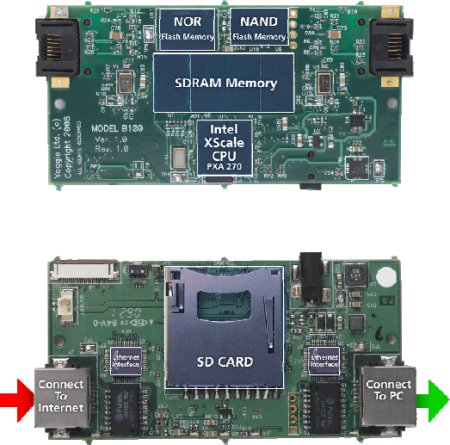Tiny Linux gadget protects Windows XP laptops
Sep 25, 2006 — by LinuxDevices Staff — from the LinuxDevices Archive — 11 views[Updated 11:30] —  Venture-funded Israeli startup Yoggie Security Systems is readying a tiny, Linux-based remote access device designed to protect Windows XP laptops. The credit-card-sized Yoggie Personal Security Gatekeeper has two Ethernet ports, and runs sophisticated firewall, VPN, and monitoring software on a… hardened Linux kernel, the company says.
Venture-funded Israeli startup Yoggie Security Systems is readying a tiny, Linux-based remote access device designed to protect Windows XP laptops. The credit-card-sized Yoggie Personal Security Gatekeeper has two Ethernet ports, and runs sophisticated firewall, VPN, and monitoring software on a… hardened Linux kernel, the company says.
(Click for larger view of the Yoggie)
digg this story |
According to Yoggie, the Gatekeeper will allow itinerant workers to securely access corporate resources from insecure networks, such as wireless hotspots found in airports and hotel rooms. The small device can support up to five simultaneous users, when placed behind a hub or switch.
 In tandem with Yoggie's “Security Manager” appliance (pictured at right), the Gatekeeper will also allow IT staff to remotely monitor systems in the field, providing “un-paralleled visibility into distributed laptop platforms, regardless of location,” the company says.
In tandem with Yoggie's “Security Manager” appliance (pictured at right), the Gatekeeper will also allow IT staff to remotely monitor systems in the field, providing “un-paralleled visibility into distributed laptop platforms, regardless of location,” the company says.
Yoggie says the Gatekeeper is easier to maintain than multiple security applications installed directly on Windows XP. And, it uses fewer resources and offers more complete partitioning than recently introduced security schemes based on OS virtualization, according to the company.
The company ultimately hopes to sell the design directly to laptop manufacturers, for direct physical integration, similar to the upcoming “Sideshow” techology supported by Windows Vista, or to the Linux-based PCI card firewalls offered by Cyberguard (formerly SnapGear).
What's under the hood?
Yoggie will offer the Gatekeeper in Basic as well as Pro models. The Pro model adds greater RAM and flash capacities, along with a slightly faster processor. The Pro model also includes a mail proxy and email security, which the Basic model lacks.

Yoggie Gatekeeper board, top and bottom
The Gatekeeper will be based on an Intel PXA270 (Bulverde) processor, clocked at 416MHz (Basic) or 624MHz (Pro). It will have 64MB or 128MB of SDRAM, and 64 or 128MB of Flash, expandable through an SD memory card slot. The Basic and Pro models will each have 4MB of “secured flash,” the company says.
I/O includes two 10/100 Ethernet ports, and a USB OTG (on-the-go) port. Presumably, SDIO-based WiFi cards will also be supported by the device, given its target use of providing secure access from public hotspots.

Gatekeeper architecture
On the software side, the Gatekeeper will run applications including the following:
- Stateful inspection firewall
- VPN client
- Intrusion detection and prevention
- Four transparent proxies: HTTP, FTP, POP3 (Pro model only), and SMTP (Pro model only)
- Antivirus, antispyware, antispam (Pro model only), antiphishing (Pro model only)
- Yoggie “Layer 8” security engine (patent pending)
- Yoggie multilayer security agent
- Content filtering
- White and black lists
- Yoggie health monitoring
- Web management and monitoring said to provide “real time, constant, consistent and un-paralleled visibility into distributed laptop platforms, regardless of location”
Additionally, the Gatekeeper will have a patent-pending capability of dynamically adjusting security levels in response to each new attack, “thereby eliminating the need for the end user or IT manager to modify security policies manually,” Yoggie says.
Shlomo Touboul, CEO and founder of Yoggie Security Systems, stated, “This is a completely new concept and will dramatically enhance worker productivity while improving security, manageability, and operability of the traveling computer.”
He added, “Fitting such a complicated security engine on a miniature Linux device while maintaining [the] highest performance is a task that requires endless optimization cycles. We are not aware of such [a] complicated implementation on a 1U 19-inch or bigger implementation, and we have taken the challenge to do it on a credit card size Linux-based board.”
Availability
The Yoggie Personal Security Gatekeeper will ship in November, through distributors in the U.S., U.K., and Germany, priced at $180 for the Basic model and $220 for the Pro model.
It will be available later direct from Yoggie.
This article was originally published on LinuxDevices.com and has been donated to the open source community by QuinStreet Inc. Please visit LinuxToday.com for up-to-date news and articles about Linux and open source.